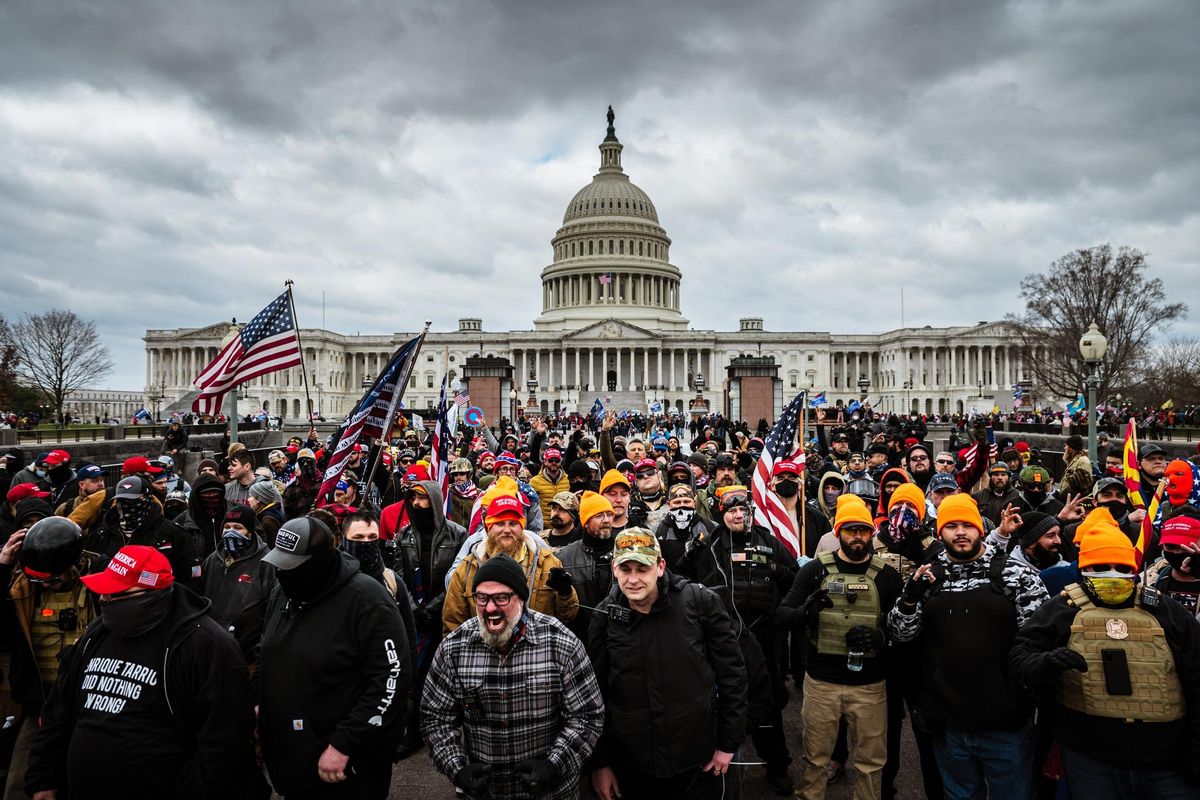Today marks the one-year anniversary of the January 6 insurrection at the Capitol.
This unprecedented act of sedition was the worst attack on US democracy since the Civil War. It was the first disruption of the peaceful democratic transition of power since 1876, and the only one to be instigated by a sitting president. I’d argue Trump’s role in it constitutes the gravest violation of the oath of office by any president in the history of the nation.
Thankfully, the insurrection failed to stop the certification of the vote and subvert the democratic order. It was destined to fail—and was not, indeed, an attempted coup—because the military, the courts, then-VP Mike Pence, former Senate Majority Leader Mitch McConnell, key state and local officials, and a majority of GOP senators ultimately sided with rule of law and the Constitution. Most of our key institutions held firm. We should be grateful for that.
But just because Jan. 6 failed, it doesn’t mean it didn’t cause lasting damage. The event shattered democratic norms, fueled tribalism and polarization, deepened our crisis of truth, normalized political violence, delegitimized our system of governance, and pushed us closer to democratic failure than we’ve been since, well, the Civil War. Recent polls show that majorities of Democrats and Republicans doubt the other party will accept negative election results in states they control in the future, and 64% of Americans now believe US democracy is “in crisis and at risk of failing.”
Want to understand the world a little better? Subscribe to GZERO Daily by Ian Bremmer for free and get new posts delivered to your inbox every week.
More importantly, the fact that Jan. 6 failed doesn’t mean that it can’t happen again. Quite the opposite, in fact. Most Americans expect it will. The response to Jan. 6 has revealed just how fragile and broken our polity is. Perhaps that’s why 68% of Americans see the insurrection as a harbinger of increasing political violence rather than an isolated incident.
Far from repudiating the events of Jan. 6 and Donald Trump for his role in them, polls show that the Republican base has embraced Trump, excused the insurrection, and doubled down on the myth of the stolen election. Despite President Trump getting impeached for an unprecedented second time, and despite an ongoing House select-committee investigation into his role that day, 72% of Republicans think the former president bears little responsibility for Jan. 6, 67% want Trump to stay on as a national figure (up 10 points since last January), and 54% say they are more likely to vote for a GOP congressional candidate if they questioned the legitimacy of the 2020 election. Recent polling also found that 6 in 10 Republicans believe Mike Pence should’ve used his role to overturn the election and over 7 in 10 are convinced that Biden stole the election.
This is mass delusion. There is zero evidence that the 2020 election outcome was in any way rigged, stolen, or conditioned by widespread fraud. But tens of millions of Republican voters believe this fiction, in large part thanks to the efforts of right-wing media outlets, influencers, elected officials, and Trump himself to perpetuate the Big Lie and deny, equivocate and excuse what happened
The problem doesn't begin and end with the Big Lie; what's troubling is how vulnerable they were to buy into this fiction in the first place, and how ready they are to treat their political opponents as mortal enemies. As Fiona Hill put it to me in an interview for the upcoming episode of GZERO World:
In many respects, [January 6] was just one episode in an ongoing struggle that we're in the midst of right now on the societal-political level about the future of the country. It was a manifestation of the deep divisions, the partisan infighting, the polarization within our society.
That’s why there’s every reason to think something resembling the Jan. 6 insurrection can and will happen again in the near future, because the conditions that led to it are still present and growing.
What happened at the Capitol wasn’t really about Trump. It was the result of decades of growing anti-establishment sentiment boiling over, a product of declining equality of opportunity, of a weak safety net that lets so many of our fellow citizens fall through the cracks, of political institutions that are widely seen as rigged, and of the wholesale loss of faith in the system’s ability to self-correct.
Don’t get me wrong, Trump was the perfect foil to tap into this anti-establishment sentiment. But if it hadn’t been him leading the charge, it would’ve been someone else. As I said on the day of the insurrection, Trump is but a symptom of something much deeper. What ails our nation long pre-dates him and will surely outlast him.
It pains me to write this because I love my country, but we as a nation haven’t done a great job at protecting our people from the vagaries of a government that no longer works for the average American. The US is richer and more powerful than ever, but it’s also the most divided, unequal, dysfunctional, and politically delegitimized it’s ever been. The forces that led to January 6 had been a long time coming. Containing them is a generational challenge.
If we don’t get serious about fixing our social contract and our politics, the next time someone tries to overturn an election—and there will be a next time—they may actually succeed. There’s no guarantee that the military, the courts, state and local officials, a future VP and majority leader, etc. will stand firm with democracy again. If there’s something the Trump presidency should have taught us, it’s that guardrails work until they don’t.
This could happen sooner than you think. Just look at the GOP’s efforts to take control of the electoral mechanisms and Trump’s ongoing campaign to purge the Republican Party of anyone who doesn’t support the Big Lie. Given how things are going now, the 2022 midterms are increasingly likely to leave Republicans in control of the House and the Senate at the federal level and with unified control of government in precisely the six states that decided the 2020 election (Arizona, Georgia, Michigan, Wisconsin, Nevada, and Pennsylvania).
🔔 And if you haven't already, don't forget to subscribe to my free newsletter, GZERO Daily by Ian Bremmer, to get new posts delivered to your inbox.


















